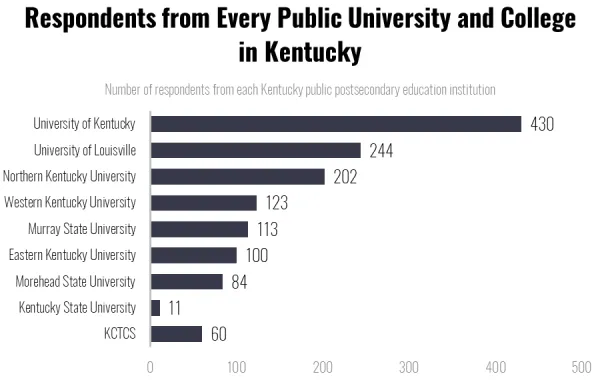When Higher Ed Is a Lower Priority: Kentucky Campus Workers Sound the Alarm
Executive Summary
Kentucky’s General Assembly has cut its contribution to higher education for the past two decades with few exceptions. This has led to students carrying more of the cost burden, stagnant wages for employees of our public colleges and universities, higher workloads and poorer student and research outcomes. This report combines analysis of data about system trends with the voices of the public postsecondary workforce to better understand the effects of underfunding.

In a survey of 1,367 employees from all eight of Kentucky’s public universities and its community college system, respondents were clear: making higher ed a lower priority has created a crisis.
Job quality is worsening:
- Over half (53%) of respondents selected pay as their top concern, with nearly one in three respondents saying they have not received a pay raise in the past year and two in three selecting pay as the number one consideration as to whether they will leave their job.
- 66% of respondents said their department is understaffed, and three quarters (77%) said staffing levels are worsening or not getting better. Respondents said lack of funding and low pay making it harder to recruit and retain staff are primary drivers of these staffing shortages.
- 63% of faculty respondents said their departments have cut tenure-track positions, and over half (55%) said they have lost administrative support.
- The cumulative result of these and other job quality issues is that seven in 10 respondents said they have considered leaving in the past year for reasons other than retiring.
Student and research outcomes are suffering:
- Faculty reported that a loss of administrative support is leading to more of their time spent on administrative paperwork (83%), recruitment efforts (57%) and supporting students through mental health challenges or crises (37%).
- 58% of respondents said the challenges they face are leading to critical programs or services being scaled back or cut altogether.
- One in three respondents reported that research outcomes are being compromised and that student outcomes are not being met.
Based on these findings, this report puts forward the following recommendations:
- Prioritize restoring public postsecondary appropriations from the legislature to inflation-adjusted pre-2008 levels.
- Rectify the inequities arising from the performance funding model, particularly in institutions serving students with the greatest need and address funding disparities at Kentucky State University (KSU) as highlighted by recent federal assessments.
- Allocate funding for significant salary adjustments to make up for long-term erosion of wages and salaries for faculty and staff.
- Express support for academic freedom through legislative measures such as simple resolutions, committee hearings and mandatory reports on academic activities, and alleviate political pressures on faculty members by acknowledging and protecting their right to academic freedom.
- Foster more inclusive governance structures by increasing the number of employees elected to institutional governing boards and thereby allowing faculty and staff to contribute more directly to the decision-making processes at their colleges and universities.
- Support the formation of unions by staff and faculty and recognize the rights of employees to organize and collectively bargain for fair compensation and better working conditions.
While respondents repeatedly described the value they place on their work, and the importance of the role they play in their communities and throughout the commonwealth, many are at a breaking point. Both the General Assembly and university administrators have a role to play in turning Kentucky’s public higher education system around. The staff and faculty of our universities and community colleges have sounded the alarm, it's up to policy makers to heed it.
View and download the full report below.
